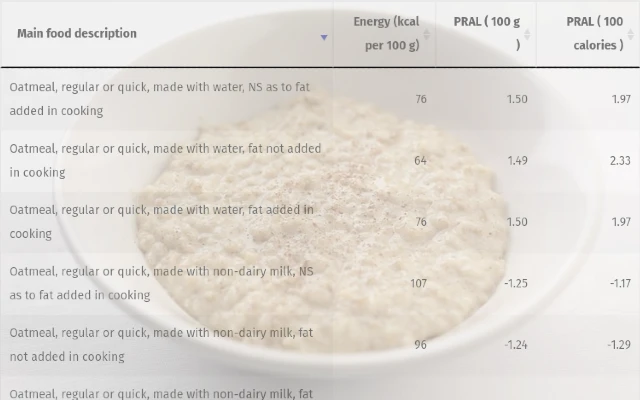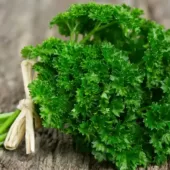Do you want to know “is oatmeal acidic or alkaline?” Well, the simple answer is that plain oatmeal made with water is acid-forming. But what does that really mean? Also, what happens when we cook oats in different ways?
Read on for the answers. Together with a complete list of PRAL values for all oat-related foods in the USDA nutrients database. But first let me explain “oat-related foods”
What is Oatmeal?
Oatmeal is the processed grain from the oat plant. Where raw oat grains are milled or cut to produce a coarse flour that is quicker to cook. So in the oatmeal food list we see both oats and oatmeal used to describe foods that contain processed oat grains.
Unless you are a farmer, the terms oats and oatmeal are interchangeable. For eating, you will be most concerned with how fine or coarse your oatmeal is. For discussions with your doctor or dietitian, you will be most concerned with your total consumption of oats. Which brings us to…
Complete Oatmeal PRAL List
The complete oatmeal PRAL list is quite big. So I’ve put it on a separate page…

On that list, as well as plain oatmeal, you will find PRAL values for oats beverages, bread, biscuits, muffins and other oat-based meals.
Is Oatmeal Acidic?
As I mentioned, plain oatmeal is acid-forming. But oats are usually eaten with other ingredients. So you can see from Acid-Alkaline Oatmeal PRAL List that you choose whether your oats-based meals are acid-forming or alkalizing.
Therefore, the simple answer to “is oatmeal acidic?” is “yes”.
Is Oatmeal Alkaline?
But alkaline diet planning is more complicated than just avoiding acid-forming foods. Because our bodies need the proteins and phosphorus that produce acid load on our kidneys. So the answer is not to avoid foods like oatmeal. Instead, we use oats as an ingredient in meals that help us reach our total PRAL alkalinity target.
So the answer to “is oatmeal alkaline?” is “no”. But it is easy to make oats-based meals that are alkaline.
Oats vs Oatmeal
For PRAL calculation purposes, I tend to ignore any difference between oats and oatmeal. After all, the calculation depends on the nutrients, not the USDA or WWEIA food description. However, there are nutritional differences between various types of raw and processed oats. So I will research these, and report on the differences as I perceive their relevance.
At the moment, this is not a priority for me. So I haven’t started a research project for oats vs oatmeal. But I’ve spotted a couple of investigations that seem to offer a starting point[1-2]. Unfortunately, these seem to be aimed at the food processing industry. But the comparisons of oats, groats, oatmeal, and oat bran might provide insights that help us make better diet choices. Let me know how this interests you. Then I’ll have a better context for starting a research project.

Is Your Oatmeal Acidic or Alkaline?
Remember, factors such as growing conditions, variety, and preparation methods affect all food nutrients. USDA database values are an average of many samples. So your PRAL values for oats-based meals will vary from day to day. But they are always an estimate of actual acid load on your kidneys. Which I explain more in the notes about PRAL principles on the category list page.
Leave Is Oatmeal Acidic or Alkaline to browse the Complete PRAL Food Category List.
Oatmeal Acidic or Alkaline Related Topics
Please remember: to find more related pages that are relevant to you, use the search box near the top of every page.
Common Terms: Enduring Nutrient Facts, grain, oatmeal
Other posts that include these terms:
- Acid-Alkaline Other Fruits and Fruit Salads PRAL List
- Alkaline Dry Fruits PRAL List
- Acid-Alkaline Other Vegetables and Combinations PRAL List
- Acid-Alkaline Starchy Vegetables PRAL List
- Alkaline Alcoholic Drinks List
- Acid-Alkaline Bananas PRAL List
- FODMAP Diet Highs and Lows
Oatmeal Acidic or Alkaline References
- Lapveteläinen, A., P. Alho‐Lehto, L. Sinn, T. Laukkanen, T. Lindman, H. Kallio, J. Kaitaranta, and J. Katajisto. “Relationships of Selected Physical, Chemical, and Sensory Parameters in Oat Grain, Rolled Oats, and Cooked Oatmeal—A Three‐Year Study with Eight Cultivars.” Cereal chemistry 78, no. 3 (2001): 322-329.
- Decker, Eric A., Devin J. Rose, and Derek Stewart. “Processing of oats and the impact of processing operations on nutrition and health benefits.” British Journal of Nutrition 112, no. S2 (2014): S58-S64.



